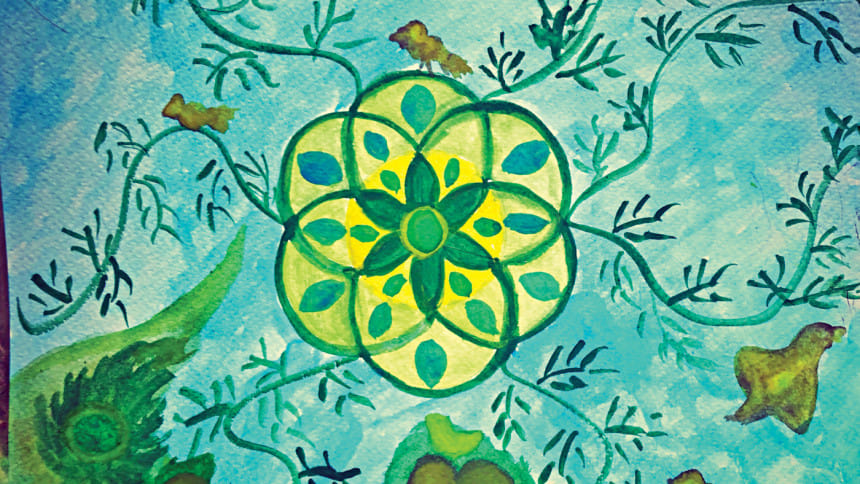Mazin

"Ekhon ami
Megh nei ar, shobai ekhon
Brishti bole daake amay"
— Joy Goswami
In the Kingdom of Rain, in the land of breeze, life moved in the rhythm of liquid glass. There, the glass was always full, and the sky never fooled one about the forecast. The stability of such ways brought people no dismays.
The Kingdom of Rain knew how to wipe tears fast if sadness ever came, despite the rain, they knew how to stay dry and even if they got wet, their smiles would never fade. They were happy and they loved and worshipped their King.
The King of Rain was suffering from a long ailment. He did not have many years to live. His only daughter, Princess Mazin, was the sole heir. She had been trained to be the perfect queen for the people of rain and rainclouds. Her name meant just that in Arabic, a cloud that carries rain, a Mazin.
Unbeknownst to all, Princess Mazin had a fall into the deep darkness of her being. And instead of preparing to take over the throne, she half-wished light to wipe her clean. It was a serious condition; her heart was always heavy and to hide this, she picked up a few conniving habits.
She mastered a plastered smile and the people of rain would look at her in awe, they marvelled at her beautiful clothes and face and the way she spoke and saw. They would say "Oh our Princess Mazin is such a delight, she is so gifted and her footsteps are peacock's flights!"
When Mazin came away from the people's stares, she would drop into her bed and wondered what was there? To life? If she herself could not feel the delight that people saw; what point was there to be a queen of the kingdom of Rain when she did not know how to let inner clouds thaw?
Mazin felt addicted to the affirmations of others, the ones who found her beautiful and clever, and happy and fit, she would turn to listen to their songs of wit, ballads that made her feel better for a minute or two; she needed such things, or she felt frozen, cold, blue.
The ill King saw on his daughter's face the story of a trapped storm holding unerring unrest. He knew he did not have enough time in hand, and the solution to the problem needed to be grand. So, the wise King called Mazin into his room, and told her she had to leave the Kingdom or there would be doom.
"Mazin, I order you to go to the land of Sand, there is an ocean there and the sun stays near, you must go there and live for a year. And do not return if you cannot rid yourself of your secret heavy tear," he said.
Mazin felt anger, yet gratitude at her Father's orders. A part of her wanted to run to the land of sun and sand, the other wanted to cling to her comforts of the land of rain, with its people showering her with compliments even though they never really saw her true face. Still, Mazin did not think that putting on a false face was a crime.
But her Father insisted, "Look Mazin, you cannot sit on the throne with falsehood in your heart, if you are to be a true queen you must find first your true self. Now go to the land of Sand and do not come back until you are free from your inner discords."
And so, Mazin left for the land of Sand, she crossed the land of Ice and Dust and reached the place at last. Everything felt unfamiliar there, the sky was too blue, no rain clouds roamed, the sun rose pink and red and set in orange, in-between the sunlight was golden — always.
It never rained. The sand was dry and warm, and when Mazin would bury her feet in them, she felt her inner storm's calm. But she did not like that feeling. It was too quiet, too still and too illumined. She felt the stillness would cause the mazin she carried inside to burst and pour and flood her earth, and then she would not be a Mazin at all, a shame to her name. Whoever had heard of a light Mazin? All rainclouds were heavy and so was she, her right since birth. She tried her best to keep herself intact.

But the land of Sand had a way of getting into everything; that was the nature of sand. Once Mazin stepped into it, it never left her. She always found sand, potent with their dry-heat, light and sea-scented, tucked between her toes, or at the ends of her dress, or in her hair, under her nails, on the pages of her books, in the drop of her mid-chest, that spot where people point to when someone asks, "Can you point to yourself?" And in answer, their index finger goes to that mid-point in the chest and they say, "Here I am."
And like that, without knowing when, sand became part of Mazin's life, and she stopped fearing the potency of their tiny heated selves, their texture that became one with her skin and travelled to her inner chambers, drawing water from a dark cloud she carried in her mid-heart. The cloud which did not know how to pour, and like an outdated identity, unwelcomingly awkward, sulky and insecure, it cried without tears.
Then one morning, Mazin woke up and saw rainclouds had gathered in the land of Sand. She had forgotten all about rain and its sound. She hurried outside to get a good glimpse as the sand whirled and danced sublime and sheer. Mazin too joined the dance and as very few people lived in this land, no one stopped to watch. Mazin twirled and sang, tears of joy swam out of her and she felt her heart's happy twang.
"I am so happy!" Mazin exclaimed, and no one was there to tell her how light she looked and how feathery she felt. Mazin did not need such affirmations anymore. Her raincloud had melted, the constant working sands had pierced through it in the depths of nights and without any great cloudbursts or pain, Mazin had become rain. She poured and poured her ecstatic drops, and the wind carried her back home — with no memory of ever being a Mazin at all, she was now a stream, of light and bliss, ever-flowing in and out of truth's desires. And they called her Rain — the evoker of transcendent emotions, the cleanser of fears, pouring blessedly wiping all tears.
Photo courtesy: Iffat Nawaz

 For all latest news, follow The Daily Star's Google News channel.
For all latest news, follow The Daily Star's Google News channel. 



Comments